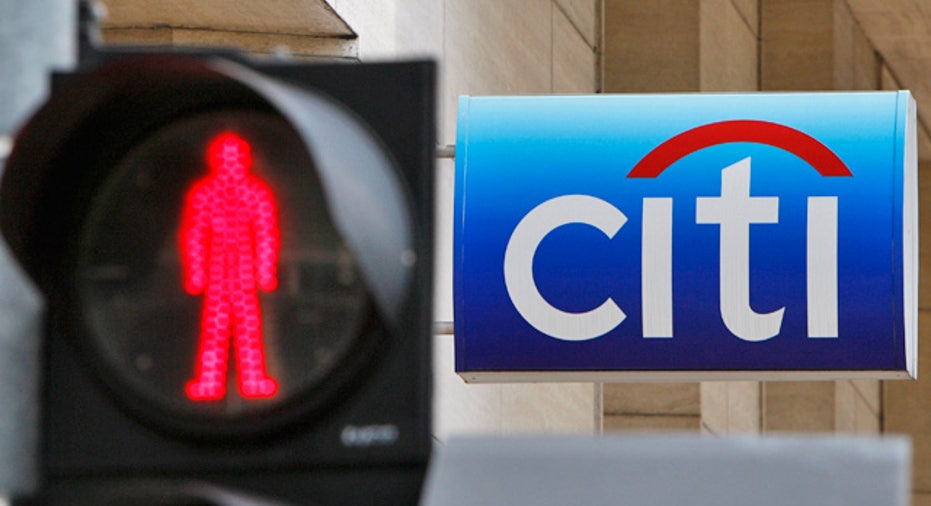Regulators Trying to Place Blame for the Financial Crisis Should Look Within

They say the wheels of justice spin slowly, but they never said they spin fairly, or for Citigroup (NYSE:C), cheaply. Word is the Justice Department and Citi are very close to ironing out a $7 billion deal to settle charges the bank sold shoddy mortgages ahead of the financial meltdown.
In case you’re counting, that’s about $30 billion the government has extracted from big banks to pay for a crisis that Washington is conveniently leaving at banks’ doorstep, and only their doorstep. Some say the No. 3 U.S. bank got off lucky. JPMorgan Chase (NYSE:JPM) got socked with $13 billion in fines. And Bank of America (NYSE:BAC) could be looking at penalties north of $12 billion (and I’m not even including BNP Paribas having to pony up $8.9 billion to settle charges it violated U.S. sanctions).
Although hardly free from sin in the financial meltdown, why is it the banks seem to be the only ones paying up? To hear regulators tell it, that’s because the banks caused the calamity and then aggravated the calamity.
There’s no arguing banks gunned the system, but why isn’t anyone pointing out who gave them the gun? Who ran the system? Who was the system? Who made the rules for the system? Who gave banks the license to collateralize bad debt and sell it, so they could make more loans as they were doing it? Who pushed them to keep lending and keep risking? Who turned home ownership from a goal to a birthright? Who not only encouraged more lending, but all but made it a law to force more lending?
Washington did that. Congress did that. Presidents under both parties did that, and encouraged that. Bill Clinton got the ball rolling when he reformed something called the Community Reinvestment Act. The goal was to encourage more lending. Unfortunately as with all good Washington intentions, that goal morphed into something entirely different.
More loans were going out, but increasingly to individuals who didn’t qualify for them. This was the mid-1990s when “no-doc” loans were the rage, and no questions were asked. And the wind at the housing market’s back was the booming demand for houses, period. More loans begot more homes and more homes begot more loans. Housing wasn’t only hot, people traded homes as if they were Internet stocks. Some bought and sold properties unseen, for quick and tidy profits that seemed unreal.
Yet no matter how hot housing got, Congress was forever asking why it wasn’t hotter, and why more Americans weren’t enjoying the ride. Banks were encouraged to lend more, and find avenues for buyers who might not be pristine.
The argument was with real estate prices always on the rise, loans always could be refinanced. And they were, again and again – homes became gigantic ATMs. Homeowners piled up the debt, then took out home equity loans to pay it all off. It was almost too easy, and its frenetic borrow-and-binge, then binge-and-borrow pattern just made it easier, and in retrospect – scarier.
Then … The Music Stopped
We now know what happened. Even before the music stopped, the tune started changing, and marginal borrowers in those sub-prime mortgages started hiccupping. Only a fraction were having problems, but the reverberations soon spread even to those who were not. Housing felt it. Banks felt it. And all those investors who bought all those repackaged mortgage loans felt it. Then the homebuilders. Then the homebuilders’ stocks. Then the banks’ stocks. Then all stocks.
But Who’s to Blame?
And all these many years later, this is how we are taking stock: Punishing the lenders, but not the folks who made them lend. Trust me, I’m no apologist for banks, and own not a single bank stock. But should it surprise anyone in Washington that if you demand banks lend, they’ll come up with a way to collateralize the risk and the damage and try to mitigate the fallout?
Remember as well how banks were ripped right after the meltdown for lending too much, then not enough, then not at all. They couldn’t win for giving loans, then giving enough loans. Nowadays they’re generally pilloried for being tight-fisted and heaven forbid, fiscally prudent. That’s an eye-popping comment from Washington!
No matter. Banks are the ones paying up. Maybe, in part, that’s as it should be. But forget about the banks being the only ones ponying up the cash. What exactly is Washington doing with all that cash? People familiar with this Citigroup $7 billion deal say the DOJ will end up with roughly $4 billion of it, and the rest will be paid in mortgage relief to homeowners. But no one’s saying “which” homeowners or how much they’ll be getting.
In prior settlements, state attorneys general have been getting their cuts, presumably for their states. But is any of that money filtering down to beleaguered homeowners in those states? I wonder.
There’s nothing wrong with holding banks accountable. But it’s almost as if Washington has decided no one else is – not politicians who kept pumping the bubble or borrowers who we’re told were railroaded into signing off on million-dollar loans with little more than $50,000 in income.
John F. Kennedy famously said success has a thousand fathers and failure is an orphan. When housing was booming, everyone was taking the credit, and every politician worth his salt was taking a bow. Until it wasn’t booming. And the fingers started pointing.
And now it’s the banks who are paying – for the mistakes a lot of folks were making.



















